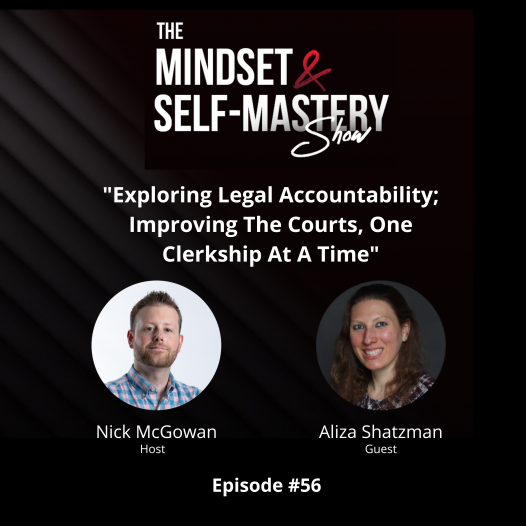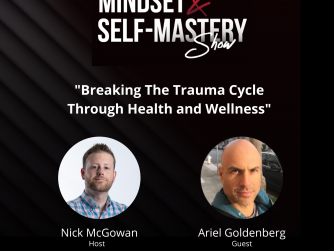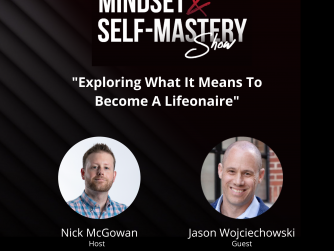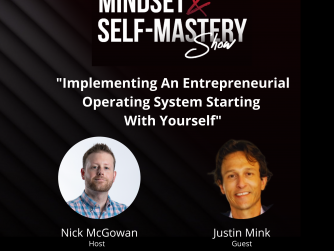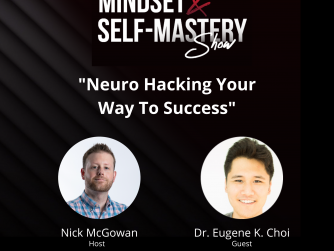Episode summary: Aliza Shatzman went to school for law and became a clerkship so she could get a government job. She needed to clerk under a judge for 1 year, that was the last of her requirements.
Unfortunately, she was unknowingly assigned to a judge who had a history of mistreatment of clerks. He discriminated against women and Aliza was no exception. He mistreated her as well and ended the clerkship early.
Aliza tried everything in her power to get a job, but with the clerkship ending early, it made it almost impossible.
After a year, she finally landed her dream job only for it to be revoked because the judge made a bad statement about her. Not only did this revoke her job offer, but it revoked all the job interviews she had. Not only had this judge harassed her then, but he continues to do damage. So what is Aliza to do?
She created a non-profit organization aimed at ensuring that law clerks have positive clerkship experiences while extending support and resources to those who do not.
Guest Name & Bio: Aliza Shatzman is the President and Co-Founder of The Legal Accountability Project, a nonprofit aimed at ensuring that law clerks have positive clerkship experiences while extending support and resources to those who do not.
Aliza earned her BA from Williams College and her JD from Washington University School of Law, where she served as an Associate Editor for the Journal of Law & Policy. After law school, Aliza clerked in D.C. Superior Court during the 2019-2020 term.
In March 2022, Aliza submitted written testimony for a House Judiciary Subcommittee hearing about the lack of workplace protections in the federal judiciary, detailing her personal experience with gender discrimination, harassment, and retaliation by a former D.C. judge.
Aliza now regularly writes and speaks about judicial accountability. She has been published in numerous forums, including the UCLA Journal of Gender & Law, Yale Law & Policy Review, NYU Journal of Legislation & Public Policy, Above the Law, Law360, Slate, Ms. Magazine, and Balls & Strikes.
EPISODE TRANSCRIPTION
[Nick McGowan]: Hey Aliza welcome to the show. How are you doing today? [Aliza Shatzman]: i’m good thanks for having me on the show [Nick McGowan]: yeah absolutely i’m glad that you’re here i’m excited to get into the conversation with [Nick McGowan]: you i got to be honest with you i don’t have too too much to [Nick McGowan]: say specifically in what you’re doing but i know this is big thing especially after [Nick McGowan]: we’ve done a recent episode with somebody you’re connected with as well mike bassett and [Nick McGowan]: that kind of opened up doors to other people that that want to be able [Nick McGowan]: to hop on the show and as we were talking before this really about the [Nick McGowan]: person but i know you’re deeply passionate about what you do so i’m excited to [Nick McGowan]: get in all of this i don’t want to take your thunder anything but why [Nick McGowan]: don’t you kick us off and tellus what you do for a living and
[Nick McGowan]: one thing that most people don’t knowabout you it’s maybe a little odd or
[Nick McGowan]: bizarre [Aliza Shatzman]: so i am the president and cofounder of the legal accountability project
[Nick McGowan]: oh [Aliza Shatzman]: we are a non profit [Nick McGowan]: yeah [Aliza Shatzman]: aimed at insuring that law clerks havea positive clerkship
[Nick McGowan]: oh [Aliza Shatzman]: experience and then extending support and resourcesto the ones who don’t um and then
[Aliza Shatzman]: interesting thing about me i’m a tattooenthusiast i have four tattoos i’m planning my
[Aliza Shatzman]: fifth for when we announce our firstschool partner for the
[Nick McGowan]: oh [Aliza Shatzman]: legal accountability project [Nick McGowan]: m [Aliza Shatzman]: which should be soon so yeah [Nick McGowan]: nice all face tattoos is that’s whatcomes next
[Aliza Shatzman]: hum i have one on each ribone of
[Nick McGowan]: oh [Aliza Shatzman]: my lower back and then persist onmy left wrist
[Nick McGowan]: that’s [Aliza Shatzman]: yeah [Nick McGowan]: awesome [Aliza Shatzman]: yeah [Nick McGowan]: isn’t it addictive like you’re sitting inthe chair
[Aliza Shatzman]: so [Nick McGowan]: and you’re [Aliza Shatzman]: addictive [Nick McGowan]: like oh [Aliza Shatzman]: yes [Nick McGowan]: what else like what’s happening next andyou’re like calm down you still got another
[Nick McGowan]: couple of hours oh [Aliza Shatzman]: yeah yeah i mean most of mineonly took like an hour an hour and
[Aliza Shatzman]: a half so [Nick McGowan]: okay [Aliza Shatzman]: i thought about like a sleeve thatmight be my next one will say
[Nick McGowan]: i’d suggest that i’d suggest that [Aliza Shatzman]: fancy [Nick McGowan]: especially when you’re sitting there and you’relike oh man what else could we do
[Nick McGowan]: especially you get an artist that’s likemaybe we can do this we can do
[Nick McGowan]: that next thing you know he’s gotyour entire body just covered tattoos
[Aliza Shatzman]: yeah [Nick McGowan]: and you look like one of thosereptilian people
[Aliza Shatzman]: i don’t think i want one thattakes
[Nick McGowan]: m [Aliza Shatzman]: multiple sittings like i’ve seen people go [Nick McGowan]: no [Aliza Shatzman]: in when i’m getting a tattoo andthey’ll be like just draw on me for
[Aliza Shatzman]: a couple of hours so i don’tknow if i’m there yet
[Nick McGowan]: no that’s a little much yeah [Aliza Shatzman]: yeah [Nick McGowan]: there are people that they basically usetheir body as like a sticker board they’re
[Nick McGowan]: like [Aliza Shatzman]: yep [Nick McGowan]: this is a cool stick or justput it here and i’ve
[Aliza Shatzman]: yeah [Nick McGowan]: seen different people in like why doyou have is that
[Aliza Shatzman]: yeah [Nick McGowan]: the ham burglar why [Aliza Shatzman]: oh [Nick McGowan]: is [Aliza Shatzman]: my [Nick McGowan]: the [Aliza Shatzman]: gosh [Nick McGowan]: ham burglar on you all [Aliza Shatzman]: oh [Nick McGowan]: though kind of drunk one night herewe go
[Aliza Shatzman]: yeah [Nick McGowan]: so i guess most people wouldn’t knowabout your tattoo because it probably doesn’t come
[Nick McGowan]: up in like normal conversation [Aliza Shatzman]: yuh [Nick McGowan]: with your profit right [Aliza Shatzman]: not normal conversation [Nick McGowan]: yeah [Aliza Shatzman]: but i work out and just [Nick McGowan]: yeah [Aliza Shatzman]: a sports brown running short so everybodyat the gym sees
[Nick McGowan]: they [Aliza Shatzman]: me [Nick McGowan]: see [Aliza Shatzman]: as [Nick McGowan]: it [Aliza Shatzman]: this like person with a lot randomtattoos i mean they’re not random
[Nick McGowan]: oh [Aliza Shatzman]: they all have yeah [Nick McGowan]: yeah you don’t have the ham burglaron you somewhere what
[Aliza Shatzman]: no [Nick McGowan]: so [Aliza Shatzman]: i’m not planning to [Nick McGowan]: you never know you might make friendswith the artist just sit down just go
[Nick McGowan]: for it so if [Aliza Shatzman]: yeah [Nick McGowan]: the hamburger ends up on your bodyyou let me know
[Aliza Shatzman]: all right [Nick McGowan]: so tell us a bit about howyou got into what you’re doing and break
[Nick McGowan]: that down a bit because not everybodylistens to the show is in the same
[Nick McGowan]: path of life as you are soas you got into what you’re doing
[Aliza Shatzman]: m [Nick McGowan]: and really the purpose behind it all [Aliza Shatzman]: sure so i got into this advocacywork based on my personal experience with gender
[Aliza Shatzman]: discrimination harassment and retaliation during and aftermy clerkship so after i graduated
[Nick McGowan]: oh [Aliza Shatzman]: from washington university school of law insaint louis in twenty nineteen i aspired to
[Aliza Shatzman]: be a homicide prosecutor in the dc s attorney’s office
[Nick McGowan]: m [Aliza Shatzman]: so i decided to clerk in dc superior court during the twenty nineteen any
[Aliza Shatzman]: twenty term because i knew that dprosecutors appeared before dcspircort judges and for folks
[Aliza Shatzman]: who are not attorneys the messaging aroundclerkships in the legal community and in law
[Aliza Shatzman]: schools is just uniformly positive it’s thisprofession confers this position confers only professional benefits
[Aliza Shatzman]: you will develop a lifelong mentor mentirelationship this judge and judges deserve just absolute
[Aliza Shatzman]: respect and total deference so i startedthis clerkship in august twenty nineteen and beginning
[Aliza Shatzman]: just weeks into it the judge forwhom i clerked began to harass me and
[Aliza Shatzman]: discriminate against me because of my genderhe kick me
[Nick McGowan]: m [Aliza Shatzman]: out of the court room and [Nick McGowan]: m [Aliza Shatzman]: tell me that i made him uncomfortable [Nick McGowan]: oh [Aliza Shatzman]: and then he just felt more comfortablewith my mail co clerk he told me
[Aliza Shatzman]: i was bossy and aggressive and nastythings it would never be said to a
[Aliza Shatzman]: man be said they were you knowassertive or confident
[Nick McGowan]: m [Aliza Shatzman]: the day i found [Nick McGowan]: m [Aliza Shatzman]: out that i passed the d cbar exam so that’s a big day for
[Aliza Shatzman]: any young attorney to e called meinto his chambers got in my face
[Nick McGowan]: oh [Aliza Shatzman]: and said you’re bossy and i knowboss because my
[Nick McGowan]: m [Aliza Shatzman]: wife is boss [Nick McGowan]: two [Aliza Shatzman]: i was devastated [Nick McGowan]: m [Aliza Shatzman]: i remember crying in the courthouse bathroomcrying myself to sleep at night i wished
[Aliza Shatzman]: i could be reassigned to another judgefor the rest of the clerkship which was
[Aliza Shatzman]: supposed to last a year m myworkplace didn’t have any sort of employee dispute
[Aliza Shatzman]: resolution or dr plan that might haveenabled that to happen i confided in some
[Aliza Shatzman]: mentors and they advised me to stickit out and i knew that i needed
[Aliza Shatzman]: a year of work experience to beeligible for a government
[Nick McGowan]: oh [Aliza Shatzman]: job i tried to stick it outand we transition to remote work during the
[Aliza Shatzman]: pandemic [Nick McGowan]: hm [Aliza Shatzman]: moved back to philly in march oftwenty twenty to stay with my parents and
[Aliza Shatzman]: worked remotely and the judge basically ignoredme for six weeks before he called me
[Aliza Shatzman]: up in late april and told mehe was ending my clerkship
[Nick McGowan]: m [Aliza Shatzman]: early because i made him uncomfortable andlacked respect for him but he didn’t want
[Aliza Shatzman]: to get into it then he hungup
[Nick McGowan]: m [Aliza Shatzman]: on me so i called d ccourts h r and they said there’s nothing
[Aliza Shatzman]: they could do h r doesn’t regulatejudges judges and lock clerks have a unique
[Aliza Shatzman]: relationship then they asked me whether iknew that i was at will employee i
[Aliza Shatzman]: reached out to my law school towash you seeking i don’t know support assistance
[Nick McGowan]: sure [Aliza Shatzman]: advice [Nick McGowan]: anything [Aliza Shatzman]: found [Nick McGowan]: yeah [Aliza Shatzman]: out this judge had a history ofmisconduct that law school officials and professors knew
[Aliza Shatzman]: about at the time i accepted theclerkship decided not to share with me presumably
[Aliza Shatzman]: because they wanted another student to clerkso it took me about a year after
[Aliza Shatzman]: that to get back on my feetthis was all pretty devastating and as i
[Aliza Shatzman]: applied for jobs i had to feela lot of questions about why this job
[Aliza Shatzman]: had ended early why the judge wasn’tlist as a reference
[Nick McGowan]: m [Aliza Shatzman]: finally secured [Nick McGowan]: oh [Aliza Shatzman]: my dream job in the dcusatorney’s officeas a prosecutor and moved back to d
[Aliza Shatzman]: c in the summer of twenty twentyone i was two weeks into training i
[Aliza Shatzman]: had already started working there when ireceived some more really devastating news that altered
[Aliza Shatzman]: the course of my life i wastold the judge had made negative statements about
[Aliza Shatzman]: me during my background investigation that iwouldn’t be able to obtain a security clarence
[Nick McGowan]: m [Aliza Shatzman]: then my job offer was being revoked [Nick McGowan]: m [Aliza Shatzman]: then a couple of days later [Nick McGowan]: oh [Aliza Shatzman]: i had a job offer or aninterview offer for a different job with that
[Aliza Shatzman]: office they revoked that too based onthe judge’s same negative reference i was two
[Aliza Shatzman]: years into my legal career and thisjudge just seemed to have enormous power to
[Aliza Shatzman]: ruin my reputation and destroy my careerso i filed a formal judicial complaint hired
[Aliza Shatzman]: attorneys and in the summer and fallof twenty twenty one participated into the investigation
[Aliza Shatzman]: into the now former judge we werepart way through that when some attorneys reached
[Aliza Shatzman]: out to me privately and told methe judge was on administrative leave pending an
[Aliza Shatzman]: investigation into other misconduct at the timehe filed the negative reference about me the
[Aliza Shatzman]: u s o the government employer wasn’talerted of that until several months later when
[Aliza Shatzman]: pursuing to our private settlement agreement soseparate from anything that judiciary could or would
[Aliza Shatzman]: do for me the former judge issueda clarifying statement addressing some but not all
[Aliza Shatzman]: of his outrageous claims about me bythen the damage had been done it had
[Aliza Shatzman]: been way too long and i ampretty much black ball from what i thought
[Aliza Shatzman]: was my dream job and during thesummer i became aware of proposed legislation called
[Aliza Shatzman]: the sary accountability act or j thatwould extend title seven protections to judiciary employees
[Aliza Shatzman]: including law clerks currently folks like meare exempt from title seven mean we can’t
[Aliza Shatzman]: see our harasses and seek dam jesfor harm is done to our lives stayed
[Aliza Shatzman]: in touch with house and senate officesinvolved with drafting that bill and when a
[Aliza Shatzman]: hearing happened in the house judiciary committeein march of twenty twenty two i said
[Aliza Shatzman]: i had written testimony sharing my storyadvocating for that legislation and then the weeks
[Aliza Shatzman]: following it i began to toss aroundsome ideas for future further advocacy work with
[Aliza Shatzman]: my friend washy classmate now co foundermatt goodman and we launched our non profit
[Aliza Shatzman]: in june to address is gaps thati see in the clerkship application process and
[Aliza Shatzman]: in these really unregulated workplaces [Nick McGowan]: well [Aliza Shatzman]: m [Nick McGowan]: that sounds like a mess it soundslike chaos from
[Aliza Shatzman]: ah [Nick McGowan]: the start but [Aliza Shatzman]: yep [Nick McGowan]: it’s also interesting that you bring upthat your partners mat maybe this is a
[Nick McGowan]: giant assumption but i assume that’s amale
[Aliza Shatzman]: yes he is that’s a good assumption [Nick McGowan]: so well i thought it was safe [Aliza Shatzman]: oh [Nick McGowan]: you never know i mean it istwenty twenty
[Aliza Shatzman]: h [Nick McGowan]: two so matt going through i assumea clerkship as well did he not deal
[Nick McGowan]: with any of the b s thatyou dealt with like at all
[Aliza Shatzman]: so mat did not clerk but hisprevious
[Nick McGowan]: okay [Aliza Shatzman]: position was in judicial education so trainingjudges on d and other issues so that’s
[Aliza Shatzman]: kind of how he comes to thiswork but
[Nick McGowan]: got it [Aliza Shatzman]: you know he’s been there with mefrom the start since i filed my judicial
[Aliza Shatzman]: complaint he was immensely supportive and [Nick McGowan]: it’s [Aliza Shatzman]: i thought [Nick McGowan]: cool [Aliza Shatzman]: he was a good person to kindof launch this venture with
[Nick McGowan]: yeah [Aliza Shatzman]: we have complimentary skill sets [Nick McGowan]: m [Aliza Shatzman]: he does a lot more of thetext stuff some of the business stuff
[Nick McGowan]: m [Aliza Shatzman]: and yeah he’s i am advocating basedon my personal experience which i think is
[Aliza Shatzman]: important but also creates unique challenges heis not so he can be more level
[Aliza Shatzman]: headed when i’m [Nick McGowan]: uh [Aliza Shatzman]: like oh my god can you [Nick McGowan]: uh [Aliza Shatzman]: this clerk [Nick McGowan]: it’s like [Aliza Shatzman]: director [Nick McGowan]: calm down [Aliza Shatzman]: told me our policy is we don’t [Nick McGowan]: yeah [Aliza Shatzman]: warn students and i’m so upset andhe’s like yeah
[Nick McGowan]: m m [Aliza Shatzman]: chill out we’ll [Nick McGowan]: oh [Aliza Shatzman]: deal with it so but [Nick McGowan]: that’s good [Aliza Shatzman]: yeah he has a great attitude likewell kind of mis and deliver so if
[Aliza Shatzman]: a lost school need something we’ll saywe can do it and ten we’ll do
[Aliza Shatzman]: it and he kind of always encouragesme to go forward and assert myself and
[Aliza Shatzman]: just kind of power through which iappreciate some
[Nick McGowan]: that’s cool it sounds like you gota good a good partnership there i think
[Aliza Shatzman]: yeah [Nick McGowan]: the biggest thing that stands out tome
[Aliza Shatzman]: m [Nick McGowan]: and law aside or industry aside itjust henshitty people
[Aliza Shatzman]: oh [Nick McGowan]: do chitty things really when somebody isnot treating you the same way not could
[Nick McGowan]: understand like if you did come inand you started yelling at somebody
[Aliza Shatzman]: yeah [Nick McGowan]: and saying things they’d be like yeahshe’s bossy she’s yelling at us
[Aliza Shatzman]: m uh [Nick McGowan]: but that would be similar if somedude came in and started yelling at things
[Nick McGowan]: however i think you’re right i knowyou’re right that when you say they would
[Nick McGowan]: look primarily at men and say wellhe’s just a bit aggressive because i’ve been
[Nick McGowan]: in that spot i’ve been in salesfor i don’t know since i was a
[Nick McGowan]: toddler basically and i know there havebeen people that have told me you’re kind
[Nick McGowan]: of aggressive but they’ve never told methey’ve never actually dismissed me like it sounds
[Nick McGowan]: like you were kind of dismissed forbeing potentially just excited about things or what
[Nick McGowan]: some people would consider it passionate aboutwhat they’re doing
[Aliza Shatzman]: yeah definitely [Nick McGowan]: there was a question that kept comingup in my mind was what the hell
[Nick McGowan]: happened to him as a child [Aliza Shatzman]: yeah [Nick McGowan]: did anybody [Aliza Shatzman]: uh [Nick McGowan]: come out of the light [Aliza Shatzman]: uh [Nick McGowan]: and [Aliza Shatzman]: m [Nick McGowan]: say hey he was touched as akid or something happened because something is clearly
[Nick McGowan]: wrong there now you said that he’sa former
[Aliza Shatzman]: yeah [Nick McGowan]: judge [Aliza Shatzman]: yes [Nick McGowan]: so [Aliza Shatzman]: so [Nick McGowan]: you say whatever you can legally sayon the show go for it
[Aliza Shatzman]: yeah so my settlement just means ican’t identify him by name and i don’t
[Aliza Shatzman]: yeah [Nick McGowan]: easy enough [Aliza Shatzman]: yeah so d c courts judges aresent at confirmed their article one judges but
[Aliza Shatzman]: they don’t have life tenure so theycan be removed so he was involuntarily retired
[Aliza Shatzman]: from the bench he i had ahistory of misconduct he mistreated other clerks other
[Aliza Shatzman]: court employees um and it’s interesting imean i think it’s a larger criticism maybe
[Aliza Shatzman]: we should be appointing that we maybechief executive should be appointing better judges because
[Aliza Shatzman]: when i to the extent i’ve talkedto some of his former colleagues yeah he
[Aliza Shatzman]: was a bad guy you know whenhe was a law firm associate too and
[Aliza Shatzman]: i think that kind of happens idon’t understand how some of these appointees just
[Aliza Shatzman]: get like power pushed through the processi mean we should
[Nick McGowan]: yeah [Aliza Shatzman]: be appointing better judges and we shouldscrutinizing them and we should be thinking about
[Aliza Shatzman]: judges as like employers running a smallworkplace they’re not
[Nick McGowan]: m [Aliza Shatzman]: gods they don’t deserve to be [Nick McGowan]: yah [Aliza Shatzman]: deified they don’t deserve absolute respect andtotal deference and i hate a legal community
[Aliza Shatzman]: continues to like confer this power uponthem
[Nick McGowan]: uh uh i mean that’s that’s hugeto say they’re not god’s because you’re right
[Nick McGowan]: nobody [Aliza Shatzman]: yeah [Nick McGowan]: nobody’s really a god anyway when itcomes to this sort of stuff and even
[Aliza Shatzman]: ah [Nick McGowan]: if even if there were gods youwould think that actual gods being here they
[Nick McGowan]: probably [Aliza Shatzman]: m [Nick McGowan]: wouldn’t be that mean as it soundslike some people are and i really again
[Aliza Shatzman]: yeah [Nick McGowan]: i don’t think it’s as much anindustry specific thing as it sounds like we’re
[Nick McGowan]: kind of starting to break some ofthe mold of that because if you think
[Nick McGowan]: of a small business co that’s justkind of a douche bag that guy could
[Nick McGowan]: be a co of fortune five companystill be a douche bag but that’s just
[Nick McGowan]: going to trickle down to a lotmore people and make things a lot worse
[Nick McGowan]: so it’s the people problem so howdo we fix that problem and how do
[Nick McGowan]: you suggest with what you’re doing willactually fix that or is this kind of
[Nick McGowan]: a bandage in a sense to beable to help people bridge from somebody
[Aliza Shatzman]: m [Nick McGowan]: being a dish to somebody being youknow nicer potentially
[Aliza Shatzman]: well i would distinguish judges from otheremployers and other industries because they have life
[Aliza Shatzman]: tenure so not [Nick McGowan]: m [Aliza Shatzman]: sake our judges but federal article threejudges have life tenure that can only be
[Aliza Shatzman]: removed by congression impeachment which basically neverhappens and so they really are able to
[Aliza Shatzman]: evade scrutiny and avoid accountability so iwould
[Nick McGowan]: that’s [Aliza Shatzman]: say [Nick McGowan]: where the [Aliza Shatzman]: that [Nick McGowan]: godsindrum comes in [Aliza Shatzman]: definitely and the longer [Nick McGowan]: got it [Aliza Shatzman]: these folks are on the bench ithink the more the god complex kind of
[Aliza Shatzman]: evolves which i [Nick McGowan]: m [Aliza Shatzman]: think is troubling and speaks to thefact that maybe these folks should not have
[Aliza Shatzman]: life tenure but yeah [Nick McGowan]: yeah why do they have life tenurefrom somebody outside of it i’m not in
[Nick McGowan]: law at all so why do theyautomatically give them life tenure
[Aliza Shatzman]: that’s how the courts were structured whenarticle three created these judges they conferred upon
[Aliza Shatzman]: them life tenure or tenure during goodbehavior which is a de facto life tenure
[Aliza Shatzman]: the problem [Nick McGowan]: m [Aliza Shatzman]: is even state [Nick McGowan]: m [Aliza Shatzman]: court judges have ten [Nick McGowan]: m [Aliza Shatzman]: or fifteen year terms they run unopposedor they are just rubber stamped for reappointment
[Aliza Shatzman]: so when i speak to state courtjudges
[Nick McGowan]: m [Aliza Shatzman]: and even once we’re doing the rightthing i mean they perceive themselves to have
[Aliza Shatzman]: de facto tenure so it’s really aproblem with deifying judges in the legal community
[Nick McGowan]: oh [Aliza Shatzman]: and then in terms of what we’redoing
[Nick McGowan]: oh [Aliza Shatzman]: about it my non profit is workingon several initiatives that are really going to
[Aliza Shatzman]: transform the clerkship landscape and really justinsure that law students considering a clerkship have
[Aliza Shatzman]: the info they need to avoid misbehavingjudges so we hope that eventually fewer folks
[Aliza Shatzman]: will apply to clerks for these notoriousharasses and that that will also lead to
[Nick McGowan]: m [Aliza Shatzman]: some larger changes if you are [Nick McGowan]: m [Aliza Shatzman]: judge and you’re no longer getting agood crop of clerks well maybe you’ll change
[Aliza Shatzman]: your behavior and if you [Nick McGowan]: ah [Aliza Shatzman]: can’t i mean it’s a way toshine some sunlight on folks who need to
[Aliza Shatzman]: be disciplined so [Nick McGowan]: that’s funny [Aliza Shatzman]: yeah [Nick McGowan]: so do you think they could belike all right here’s a couple of clerks
[Nick McGowan]: these people kind of seem like jerkslet’s give them to the other let’s give
[Nick McGowan]: him to the jerks so there’s likea
[Aliza Shatzman]: ah [Nick McGowan]: big bunch of them i don’t idon’t
[Aliza Shatzman]: yeah [Nick McGowan]: know if the judges will be likewait these people really mean they’re worse than
[Nick McGowan]: i am maybe i should change myways hold up here
[Aliza Shatzman]: i mean i suggested once so wedo i do a lot of events for
[Aliza Shatzman]: the legal accountability project so i’m atlaw school and my words got twisted when
[Aliza Shatzman]: i suggested this in an event acouple of months ago but i suggested
[Nick McGowan]: oh [Aliza Shatzman]: for judges who are mis treating theirclerks
[Nick McGowan]: yeah [Aliza Shatzman]: one form of discipline could be totake away their clerks
[Nick McGowan]: yeah [Aliza Shatzman]: they can clerks can be reassigned [Nick McGowan]: oh [Aliza Shatzman]: so take away all their [Nick McGowan]: m [Aliza Shatzman]: clerks and they have to do allthe work all the research and the writing
[Aliza Shatzman]: we can’t remove these folks but wecould punish them in that way and some
[Aliza Shatzman]: like i mean clerkship director who iskind of not acting in good faith suggested
[Aliza Shatzman]: that i wanted to abolish clerkships whichi’m
[Nick McGowan]: get out [Aliza Shatzman]: true [Nick McGowan]: of here come on [Aliza Shatzman]: we have a couple bad actors inthe clerkship workplace but yeah i mean we
[Aliza Shatzman]: should be thinking of creative ways todiscipline these judges in the absence of changing
[Nick McGowan]: m [Aliza Shatzman]: the life tenure site she [Nick McGowan]: that’s interesting it’s like how do youscrew with a demi god at that point
[Nick McGowan]: if somebody’s trying to play god likeall right we’ll take away all the toys
[Nick McGowan]: so you can’t use people now yougot to do everything on your own
[Aliza Shatzman]: i mean the other issue is thatlaw clerks who face mistreatment and this issue
[Aliza Shatzman]: is pervasive and unaddressed [Nick McGowan]: okay [Aliza Shatzman]: in both the state and federal courtsbut law clerks are quite fearful of reputational
[Aliza Shatzman]: harm in the legal community [Nick McGowan]: sure [Aliza Shatzman]: which is you know an employer punishingyou for speaking out against your harasser or
[Aliza Shatzman]: judges retaliating against these former clerks andthere really are no protections against that so
[Aliza Shatzman]: law clerks are not speaking out evenin the face of outrageous mistreatment enabling these
[Aliza Shatzman]: judges to continue to get away withit and they know nobody is going to
[Aliza Shatzman]: speak out against them [Nick McGowan]: yeah [Aliza Shatzman]: and i think that’s one reason whythings are so
[Nick McGowan]: yeah [Aliza Shatzman]: tough my former supervisor i mean somebodywas speaking out
[Nick McGowan]: yeah [Aliza Shatzman]: and unfortunately [Nick McGowan]: what do i do [Aliza Shatzman]: yeah unfortunately people should have spoken outsooner but
[Nick McGowan]: yeah [Aliza Shatzman]: i just really want to like asi am sharing my experience public and so
[Aliza Shatzman]: frequently it’s about empowering law students todemand safer work places but also inspiring current
[Aliza Shatzman]: former clerks to speak out against theirharasses and it’s really
[Nick McGowan]: yeah [Aliza Shatzman]: by shining sun light on these radicallyunder address and secret issues that were going
[Aliza Shatzman]: to change the culture and that’s abigger that’s a bigger challenge going
[Nick McGowan]: yeah [Aliza Shatzman]: from one of deifying judges and disbelievinglaw clerks to
[Nick McGowan]: m [Aliza Shatzman]: one where everybody brings their full selvesto work and no judge thinks that he’s
[Aliza Shatzman]: going to get out away with outrageousmistreatment
[Nick McGowan]: what a novel idea everybody just don’tbe a jerk but we start at that
[Nick McGowan]: level [Aliza Shatzman]: but it’s really [Nick McGowan]: have [Aliza Shatzman]: about [Nick McGowan]: you seen [Aliza Shatzman]: i mean [Nick McGowan]: people [Aliza Shatzman]: changing the culture though like they [Nick McGowan]: yeah [Aliza Shatzman]: people get away with harassing behavior because [Nick McGowan]: oh [Aliza Shatzman]: nobody questions them and people are fearfulso
[Nick McGowan]: yeah well have you seen more andmore people come out of the wood work
[Nick McGowan]: even pull you to the side likelittle side bar like hey i’m glad you’re
[Nick McGowan]: doing this because whatever their story is [Aliza Shatzman]: yeah so i receive outreach like socialmedia email stuff like that every day from
[Aliza Shatzman]: current former clerks thanking me [Nick McGowan]: m [Aliza Shatzman]: confiding in me sharing their stories forthe first
[Nick McGowan]: m [Aliza Shatzman]: time which is very edifying and ireceive disproportion ate outreach from the law schools
[Aliza Shatzman]: that are our toughest administrations where theysay things like you know we’re blessed to
[Aliza Shatzman]: work with only good judges in thiscircuit all our students positive clerkship experience so
[Aliza Shatzman]: i receive disproportion out reach from [Nick McGowan]: oh [Aliza Shatzman]: those law school lums the issue ismost of them say they will never speak
[Aliza Shatzman]: publicly which is always hard to hearand my co founder likes to call me
[Aliza Shatzman]: like a hat old so i takethe heat for people who can’t and that’s
[Nick McGowan]: m [Aliza Shatzman]: fine but i really [Nick McGowan]: m [Aliza Shatzman]: do think more folk should be empoweredto speak out i mean it’s been healing
[Aliza Shatzman]: and empowering for me every time sharemy experience
[Nick McGowan]: but ah [Aliza Shatzman]: and [Nick McGowan]: oh [Aliza Shatzman]: what i really try to tell peoplewho are fearful is that there is no
[Aliza Shatzman]: guarantee that if you stay silent thejudge who mistreated you will stop mistreating you
[Aliza Shatzman]: like there is nothing to destroy someonein a position of power or there’s nothing
[Aliza Shatzman]: to stop them from continuing to treatyou
[Nick McGowan]: yeah [Aliza Shatzman]: destroy your career [Nick McGowan]: oh [Aliza Shatzman]: and like there was a lot ofdialogue there is a lot of dialogue each
[Aliza Shatzman]: clerkship application cycle and social media twitterand stuff like that about clerkships and during
[Aliza Shatzman]: this several months period when i wasgoing through the judicial investigation and when i
[Aliza Shatzman]: hadn’t yet spoken [Nick McGowan]: m [Aliza Shatzman]: publicly i found the conversation enormously frustratingbecause it was so uniformly positive and i
[Aliza Shatzman]: was just waiting to share my storylike eight
[Nick McGowan]: m [Aliza Shatzman]: months ago if i were some randomtalking about clerkships nobody would care like what
[Aliza Shatzman]: is you know now they [Nick McGowan]: yeah [Aliza Shatzman]: know that i’m like a trusted soreso i
[Nick McGowan]: ah [Aliza Shatzman]: can comment but i cannot imagine facingmistreatment on deciding to stay silent for the
[Aliza Shatzman]: rest of your career how [Nick McGowan]: ah [Aliza Shatzman]: enormously painful and isolating that is becausepeople tell me or people who kind of
[Aliza Shatzman]: speak out and say the right fassionaldecision
[Nick McGowan]: yeah [Aliza Shatzman]: would have been not to report thosefolks i know are kind of no conveying
[Aliza Shatzman]: their personal pain in their decision notto speak publicly so
[Nick McGowan]: yeah [Aliza Shatzman]: i would encourage everybody [Nick McGowan]: yeah [Aliza Shatzman]: that it’s empowering to share your experienceand it will help somebody else
[Nick McGowan]: oh big time i [Aliza Shatzman]: ah [Nick McGowan]: love that you brought that up asthe last bit of that it’ll help somebody
[Nick McGowan]: else i think no matter what [Aliza Shatzman]: ah [Nick McGowan]: the story is even with the podcasti mean this has been therapeutic but it
[Nick McGowan]: also helps a lot of people andas you talk
[Aliza Shatzman]: yeah [Nick McGowan]: more and more and more about itit also helps you to better understand how
[Nick McGowan]: people work how things work et ceterajust like with you talking the situation that
[Nick McGowan]: you have will open the door tosomebody else i’m sure there are times where
[Nick McGowan]: somebody says something we’re like huh i’vebeen doing this a little while i’ve seen
[Nick McGowan]: a lot of things talked to alot of people but that’s new or that’s
[Nick McGowan]: something that’s a bit diffr and sohow would you encourage somebody that is maybe
[Nick McGowan]: in law or in some nine tofive job or their career and they have
[Nick McGowan]: somebody in leadership that’s honestly a painin the ass them and kind of makes
[Nick McGowan]: their life kind of hell at timeshow would you
[Aliza Shatzman]: m [Nick McGowan]: how would you encourage them to beable to work through that situation
[Aliza Shatzman]: yeah i mean the hard [Nick McGowan]: oh [Aliza Shatzman]: thing is it’s really about documenting everythingtaking
[Nick McGowan]: oh [Aliza Shatzman]: notes confiding in people and keeping trackof who you confided in and that’s not
[Aliza Shatzman]: anybody’s first ide when somebody is mistreatingyou and your boss is harassing you your
[Aliza Shatzman]: first thought is not i should takenotes and keep
[Nick McGowan]: yeah [Aliza Shatzman]: track but [Nick McGowan]: yeah [Aliza Shatzman]: like it really [Nick McGowan]: document [Aliza Shatzman]: is the [Nick McGowan]: at law [Aliza Shatzman]: most yeah it really is so important [Nick McGowan]: yeah [Aliza Shatzman]: as i think about going through thejudicial investigation and the notes di kept in
[Aliza Shatzman]: the documentation i had like now itake
[Nick McGowan]: m [Aliza Shatzman]: copious notes after every conversation i meanlike most conversations and that is why because
[Aliza Shatzman]: i know how important it is peopleto have a record and i was at
[Aliza Shatzman]: law school events a couple of weeksago where we were calling out a clerkships
[Aliza Shatzman]: director who was stone walling us andi check my notes like pulled out my
[Aliza Shatzman]: notes and started reading from her emailand like you know
[Nick McGowan]: yeah [Aliza Shatzman]: because we documented um [Nick McGowan]: yeah [Aliza Shatzman]: so yeah it’s about keeping track ofwhat’s going on and i would also courage
[Aliza Shatzman]: people to reach out to h rthe equivalent viola complaint
[Nick McGowan]: yeah [Aliza Shatzman]: i mean [Nick McGowan]: oh [Aliza Shatzman]: there is no reason to continue toendure mistreatment and
[Nick McGowan]: m [Aliza Shatzman]: it’s hard because a workplace h ris set up to protect the employer or
[Aliza Shatzman]: not the employes and really are courtlaws right now i mean if you’re thinking
[Aliza Shatzman]: about suing someone those are also setup to protect abusers and they shouldn’t be
[Aliza Shatzman]: so it’s difficult but nobody should continueto undergo mistreatment and
[Nick McGowan]: m m [Aliza Shatzman]: yeah [Nick McGowan]: what would you suggest that they actuallyhave that conversation because you’re right i mean
[Nick McGowan]: if somebody’s being mean or mistreating youin any way you don’t automatically think who
[Nick McGowan]: if i talked to about this thingand you
[Aliza Shatzman]: yeah [Nick McGowan]: know kind of walk throg all ofthat but did did you have a conversation
[Nick McGowan]: or did you try to have aconversation and it just didn’t work like when
[Nick McGowan]: would you suggest that somebody actually takethat next step um first being actually have
[Nick McGowan]: a conversation with the person and gohey what’s up why are you hating on
[Nick McGowan]: me [Aliza Shatzman]: gosh i’m trying to think did iever say why are you treating me i
[Aliza Shatzman]: don’t think so i mean he wouldcall me into his chambers and just start
[Aliza Shatzman]: braiding me and the thing about theseclerkships and the enormous power disparity between wall
[Aliza Shatzman]: clerk and judge is [Nick McGowan]: m [Aliza Shatzman]: clerks know that these folks have enormous [Nick McGowan]: ah [Aliza Shatzman]: power over our careers and reputations andthat having a conversation is probably not going
[Aliza Shatzman]: to change bad behavior i think [Nick McGowan]: m [Aliza Shatzman]: it’s little different in clerkships [Nick McGowan]: m [Aliza Shatzman]: than in some other jobs like ifyou work at a law firm or you
[Aliza Shatzman]: work in some other industry there areother places you can go you can go
[Aliza Shatzman]: to a co worker you can goto another supervisor the with these clerkships and
[Aliza Shatzman]: why it’s [Nick McGowan]: m [Aliza Shatzman]: a workplace that’s so conducive to harassment [Nick McGowan]: oh [Aliza Shatzman]: because it’s so isolated it is acouple low clerks and a judge working
[Nick McGowan]: yeah [Aliza Shatzman]: long hours behind locked doors in stressfulcircumstances and there’s no place for a lock
[Aliza Shatzman]: clerk to go because every judge canthere’s their workplace to be their little fhieftem
[Aliza Shatzman]: and if you talk to judges aboutlike calling out their colleagues they’ll say it’s
[Aliza Shatzman]: not my chambers it’s not my businessso if you are in a position of
[Aliza Shatzman]: power it’s [Nick McGowan]: m [Aliza Shatzman]: about having those tough conversations when yousee a colleague acting badly but i mean
[Aliza Shatzman]: definitely if you’re in a workplace facingmystery events it’s about addressing it sooner rather
[Aliza Shatzman]: than later i know it’s enormously scaryand difficult but the longer you let those
[Aliza Shatzman]: issues fester the worse they’re going tobe and if you haven’t kept notes and
[Aliza Shatzman]: you haven’t kept track it’s going tobe even more challenging um but i definitely
[Aliza Shatzman]: see as the future of minon profitone initiative we want to create a employment
[Aliza Shatzman]: attorney data base to connect law clerkswith attorneys who can help because like to
[Aliza Shatzman]: take the enormous steps that i didfiling a complaint participating in the investigation you
[Aliza Shatzman]: need to have an attorney and thatit is hard especially if you’ve just been
[Aliza Shatzman]: fired like where you goin to getthe money for that
[Nick McGowan]: yeah [Aliza Shatzman]: and in the judicial context and inthe legal community attorneys are notoriously unwilling to
[Aliza Shatzman]: take on law cases because they fearretaliation or reputational harm by judges it’s also
[Aliza Shatzman]: about encouraging attorneys to take on thesetough cases and i’m enormously
[Nick McGowan]: oh [Aliza Shatzman]: grateful for everything my attorneys did forme so yeah there’s
[Nick McGowan]: bet [Aliza Shatzman]: a lot [Nick McGowan]: and [Aliza Shatzman]: of issues that need to be addressedin the legal community
[Nick McGowan]: i’m learning yeah yeah as you kindof open it up more and more it’s
[Nick McGowan]: interesting how it’s kind of like a [Aliza Shatzman]: oh [Nick McGowan]: festering problem that’s within its own nichethat has its own littl bubbles i could
[Nick McGowan]: i’ve never been in those circles buti could imagine hearing somebody go hey that’s
[Nick McGowan]: not my chambers they do like howthey run their business is how they run
[Nick McGowan]: their business but at the core we’reall human so if you know that somebody
[Nick McGowan]: is being mistreating another human there shouldbe some problem with that at a human
[Nick McGowan]: level but then again if they’ve playedthat same game for years years decades or
[Nick McGowan]: even centuries i mean how far backdoes it go you mentioned
[Aliza Shatzman]: yeah [Nick McGowan]: earlier when i asked about how dothey get life tenure well it was written
[Nick McGowan]: that way makes sense if a god [Aliza Shatzman]: m [Nick McGowan]: or a demi god is basically goingto write something up might as well serve
[Nick McGowan]: them so i think [Aliza Shatzman]: yes [Nick McGowan]: it’s a whole different cannaworms we canget into on the whole government realm and
[Nick McGowan]: all of that sort of stuff [Aliza Shatzman]: and i mean change is going tobe especially slow in the judiciary because these
[Aliza Shatzman]: are the folks interpreting the laws whichmakes
[Nick McGowan]: yeah [Aliza Shatzman]: it enormously difficult and right now theonly workplace protections are judiciary internals self policing
[Aliza Shatzman]: and honestly when judges are tasked withinvestigating and potentially disciplining their colleagues internal self
[Aliza Shatzman]: discipline leads to a lack of disciplinebecause judges are just notoriously unwilling you discipline
[Aliza Shatzman]: their colleagues and so it’s a couple [Nick McGowan]: m [Aliza Shatzman]: issues its issues in the judiciary andlack of workplace protections it’s the exemption from
[Aliza Shatzman]: title seven it’s the fact these judgesare never disciplined and judges are just defending
[Aliza Shatzman]: their colleagues judiciary leadership is saying harassand retaliation are just not big problems it’s
[Aliza Shatzman]: the legal community continuing to deify thesejudges and it’s also law schools and this
[Aliza Shatzman]: is the reason my non profit isworking on initiatives with law schools they are
[Aliza Shatzman]: part of the problem funneling [Nick McGowan]: yeah [Aliza Shatzman]: students into clerkships they know or suspector bad in order to fluff up their
[Aliza Shatzman]: number of law clerks and i thinkthey should be the first to step forward
[Aliza Shatzman]: and make changes they are the idealvictors for change
[Nick McGowan]: m [Aliza Shatzman]: i mean clerkship directors are focused onthe number of placement’s period good bad debt
[Aliza Shatzman]: stating career ending [Nick McGowan]: m [Aliza Shatzman]: and they really some of them justdon’t care i’ve had deans and clerkship directors
[Aliza Shatzman]: including the deans of my law schoolwash you tell me that our official policy
[Aliza Shatzman]: is not to warn students about judgeswho we know harass their clerks that is
[Nick McGowan]: official [Aliza Shatzman]: outrageous [Nick McGowan]: policy did not warn people [Aliza Shatzman]: and yes [Nick McGowan]: crazy [Aliza Shatzman]: it’s outrageous and despicable yes um andlook when
[Nick McGowan]: yeah [Aliza Shatzman]: i talk to people who are atlike harvard yale when allegations came out against
[Aliza Shatzman]: former judge kazinski and the late judgestephen rinehart what bubbled up is that all
[Aliza Shatzman]: the faculty knew that these were notoriousharassersbut also did not disclose this information to
[Aliza Shatzman]: students who continue to pursue ninth circuitfancy clerkships with notorious harassers the people who
[Aliza Shatzman]: most need the info are these impressionablestudents taking the first important steps in their
[Aliza Shatzman]: legal career and the idea that itis professors and administrators at these law schools
[Aliza Shatzman]: concealing information it’s just respectable it’s reallydespicable my
[Nick McGowan]: man that is a lot i thinkthere’s there’s a lot it sounds like you’re
[Nick McGowan]: doing with [Aliza Shatzman]: oh eh [Nick McGowan]: with your organization but one thing wehaven’t touched on is major piece that has
[Nick McGowan]: to deal with you and your mindset how did you deal with that not
[Nick McGowan]: thinking about where you’re at now butlooking back to where you were kind of
[Nick McGowan]: looking at that movie as you weredealing
[Aliza Shatzman]: hm [Nick McGowan]: with this as you work kind ofgoing through it and
[Aliza Shatzman]: oh [Nick McGowan]: then starting down the path of maybei need to actually do something about this
[Nick McGowan]: because the guy is not letting up [Aliza Shatzman]: m [Nick McGowan]: how did you manage [Aliza Shatzman]: yeah [Nick McGowan]: those days without either freak ing outor just saying screw it i’m done how
[Nick McGowan]: did you manage that [Aliza Shatzman]: yeah so my story also has severaliterations so there was the first part when
[Aliza Shatzman]: i was fired from this clerkship duringthe pandemic staying with my parents and then
[Aliza Shatzman]: i was just trying to find anew job i had written up
[Nick McGowan]: hm [Aliza Shatzman]: a judicial complaint i had connected withsome judges i intended to file it with
[Aliza Shatzman]: the local judicial conduct commission but iwanted to wait to file it till i
[Aliza Shatzman]: had a new job because i fearedthe judge would retaliate against me
[Nick McGowan]: m [Aliza Shatzman]: and so then it was about justtrying to find a new job and the
[Aliza Shatzman]: pandemic was hard on my family iwas just a terrible time so i needed
[Aliza Shatzman]: to find a job so then therewas the iteration where i moved back to
[Aliza Shatzman]: d c and there’s this outrageous negativereference um and i was fortunate to find
[Aliza Shatzman]: attorneys pretty quickly i filed my complaintpretty quickly and got that moving and look
[Aliza Shatzman]: the judicial misconduct investigation was just anenormously painful process and it took me a
[Aliza Shatzman]: while to decide what to share publiclyabout that and i have written and spoken
[Aliza Shatzman]: it bit more recently about it theinvestigator handling my complaint she said things to
[Aliza Shatzman]: me like you must have done somethingwrong because the judge hired you in the
[Aliza Shatzman]: first place she spent like hreehours needlingme about why i couldn’t ad just to
[Aliza Shatzman]: the judge’s unique work style of harassingme it was just
[Nick McGowan]: yeah [Aliza Shatzman]: terrible um and then after a coupleo months that i was told my complaint
[Aliza Shatzman]: was going to be dismissed and becauseit was a judicial misconduct investigation they didn’t
[Aliza Shatzman]: have to issue findings of fact ihad no appeal rights just done so it
[Aliza Shatzman]: was enormously isolating i hadn’t told myfamily anything i hired attorneys on my own
[Aliza Shatzman]: i confided in a few friends alittle bit but look when people are going
[Aliza Shatzman]: through any sort of misconduct investigation letalone any sort of like title seven or
[Aliza Shatzman]: workplace litigation it’s enormously isolating and itwas really terrible time pretty early on in
[Aliza Shatzman]: that process i decided that i wantedto speak publicly about my experience there was
[Aliza Shatzman]: a former clerk for the late judgeryan hard who testified house judiciary in twenty
[Aliza Shatzman]: twenty and i watched that testimony wheni was still deep in the clerkship house
[Aliza Shatzman]: came and i found that very [Nick McGowan]: m [Aliza Shatzman]: empowering and her message of you knowyou’re not alone i thought that was amazing
[Aliza Shatzman]: so i wat our testimony a bunchof times and then i started working on
[Aliza Shatzman]: a law journal article with the uc journal of gender and law which i
[Aliza Shatzman]: thought was going to be my firstpublic statement and the intro and conclusion of
[Aliza Shatzman]: my personal story and then the bodyof it is advocating for the judiciary accountability
[Aliza Shatzman]: act and an amendment to cover thed c courts and other article one courts
[Aliza Shatzman]: so this house judiciary hearing [Nick McGowan]: m [Aliza Shatzman]: happened in march and gave me anopportunity to
[Nick McGowan]: oh [Aliza Shatzman]: speak sooner but like i wrote thisreally lengthy i mean it started is fifty
[Aliza Shatzman]: pages and end up being a hundredpages law journal article
[Nick McGowan]: yeah [Aliza Shatzman]: like over labor day weekend and likethree
[Nick McGowan]: m [Aliza Shatzman]: days not sleeping writing the first draftso i was just powering through it that
[Aliza Shatzman]: was healing and then you know doingadvocacy work and writing and those things were
[Aliza Shatzman]: healing as well [Nick McGowan]: okay [Aliza Shatzman]: which is why i am such anadvocate for people sharing their stories it’s been
[Aliza Shatzman]: empowering and healing for me and it’sgratifying that people thank me and tell me
[Aliza Shatzman]: that it helps them to i want [Nick McGowan]: hm [Aliza Shatzman]: other people to know that they arenot alone and the d c commission on
[Aliza Shatzman]: judicial disabilities and tenure that’s the regularto body for local judges i think they
[Aliza Shatzman]: thought that dismissing my complaint would silenceme and i’m confident that the former judge
[Aliza Shatzman]: and his the team thought that tooand that hasn’t silenced me in any way
[Aliza Shatzman]: it definitely made me feel shame andpain in the early days wondering what people
[Aliza Shatzman]: would think when they knew that mycomplaint had been dismissed but the vast majority
[Aliza Shatzman]: complaints by law clerks are and thatsays nothing about the complainant and everything about
[Aliza Shatzman]: the system that’s set up to protectthese misbehaving judges
[Nick McGowan]: m [Aliza Shatzman]: but i know that as i’m sharing [Nick McGowan]: oh [Aliza Shatzman]: my story publicly i hope it’s oneof empowerment but i’m also talking about all
[Aliza Shatzman]: these terrible things that happened to meand our law clerks and other folks going
[Aliza Shatzman]: to think it’s not worth coming forwardi hope that’s not the message my message
[Aliza Shatzman]: is you should absolutely come forward becausewe’re not going to
[Nick McGowan]: hm [Aliza Shatzman]: change the culture until there’s just aground swell of folk sharing their stories
[Nick McGowan]: that’s interesting it sounds like you kindof got on to the mission almost pretty
[Nick McGowan]: quickly where you saw that there wasan opportunity to jump on the mission and
[Nick McGowan]: i get that it’s helping you processas you go almost like i think of
[Nick McGowan]: like a closet where you’re like i’mgoin a clean out this closet that hasn’t
[Nick McGowan]: been cleaned out fifteen years you gotto take everything out and process
[Aliza Shatzman]: m [Nick McGowan]: through it and then figure out what’strash or what you’re keeping but you’re still
[Nick McGowan]: on the mission to be able todo that thing so outside of the mission
[Nick McGowan]: and doing the work on the missionhow are you actually taking care of your
[Nick McGowan]: mindset and you as a person dailylike what does that look like for you
[Nick McGowan]: do you met at your journal youjust wake up and you just
[Aliza Shatzman]: yeah [Nick McGowan]: eat a bowl of let’s get afterit and
[Aliza Shatzman]: oh [Nick McGowan]: just go straight into it [Aliza Shatzman]: pretty much i go to sleep andwake up thinking about judges
[Nick McGowan]: okay [Aliza Shatzman]: and clerkships and i mean honestly wheni
[Nick McGowan]: so [Aliza Shatzman]: was [Nick McGowan]: there’s [Aliza Shatzman]: a law [Nick McGowan]: zero [Aliza Shatzman]: student [Nick McGowan]: balance m [Aliza Shatzman]: no not at all like when iwas a law
[Nick McGowan]: a [Aliza Shatzman]: clerk and a law student and goingthrough all this i never thought i’d spend
[Aliza Shatzman]: all my time like thinking about clerkshipsand judges and yeah that’s what i’m doing
[Aliza Shatzman]: i mean i work out every day [Nick McGowan]: m [Aliza Shatzman]: though i’m usually the elyptical responding [Nick McGowan]: yeah [Aliza Shatzman]: to emails or doing [Nick McGowan]: m [Aliza Shatzman]: things related to the non profit buti mean i have a good support system
[Aliza Shatzman]: now and it’s really been strengthened honestlyby my speaking publicly and becoming somewhat of
[Aliza Shatzman]: a public figure on these issues inow have a much
[Nick McGowan]: m [Aliza Shatzman]: better support system than i was actuallygoing through the judicial complaint process and i
[Aliza Shatzman]: appreciate that and i hope the peoplewho are empowered and galvanized by my story
[Aliza Shatzman]: will reach behind them and help thenext person as well
[Nick McGowan]: yeah and keep it going that’s great [Aliza Shatzman]: yeah [Nick McGowan]: hey what’s that one piece of adviceyou’d give to our audience that’s on their
[Nick McGowan]: path towards self mastery [Aliza Shatzman]: yeah oh gosh that’s a good questionfind something that inspires you to get up
[Aliza Shatzman]: in the morning and you know focusyour work and your life on issues that
[Aliza Shatzman]: galvanize you i mean i have reallycombined my work and my personal mission my
[Aliza Shatzman]: personal story and i think that’s importantthat if you are working on issues that
[Aliza Shatzman]: inspire you if you were doing somethingevery day that galvanizes you to keep going
[Aliza Shatzman]: i mean that’s how you’re goin tofind meaning in your life certainly how i
[Aliza Shatzman]: found meaning in my own life [Nick McGowan]: that’s great that’s awesome and it’s beensuch a pleasure having you on i appreciate
[Nick McGowan]: being able to get into these deeptopics and i appreciate that there’s somebody like
[Nick McGowan]: yourself at saying well if nobody elseis going to step up to do it
[Nick McGowan]: i’m tired of this b s andyou
[Aliza Shatzman]: my [Nick McGowan]: go do it so that’s beautiful wherecan people find you and connect with you
[Aliza Shatzman]: um they can find me on linkedin using my name eliza shots man or
[Aliza Shatzman]: adeliza shots man on twitter they can [Nick McGowan]: oh [Aliza Shatzman]: look at our non profits website that’s legal accountability project dot or and they can [Aliza Shatzman]: email me there reach out i’m always happy to chat with people about these issues [Nick McGowan]: awesome and again thanks again for being on the show we appreciate your time [Aliza Shatzman]: thanks for having me

